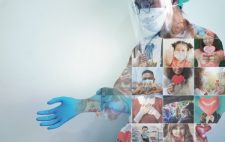Richard Byrne, MD, teaches medical residents how to treat patients in moments of dire need – and how to save their lives. The associate program director for Emergency Medicine at Cooper University Hospital with more than a decade of experience says there’s little he hasn’t seen, heard or experienced in the ER. Until COVID-19.
In his own words, Byrne describes today’s harsh realities in the ER.
If I don’t get this right, in the next 15 minutes, this person is going to die right in front of me. When you’re taking care of any critically ill patient, that’s always a thought in the back of your mind.
Emergency-medicine doctors have experience seeing gravely ill patients. But with Coronavirus patients, we’re facing something completely new.
There’s a lot of them, all requiring the same resources – resources already in short supply – and contagious to a point where you need extreme precaution just to treat them. The oxygen levels in their lungs are more severe than we’ve ever seen. The closest we can compare it to is the damage we see in patients who have chronically damaged lungs, and even that doesn’t fully compare. It’s intense. The realization that these patients have a serious infection that can be spread through our staff is unlike anything we’ve ever experienced.
The moment a patient walks through the emergency room doors, they’re immediately seen by a triage nurse to check their vitals. Those showing any Coronavirus symptoms who are stable are brought outside to a tent set up specifically to treat less severe COVID-19 patients. But if they’re very ill, we give them a mask and bring them to a “negative pressure room,” which means the air circulation is sucked into the room from a ventilation system instead of being blown out, where it could possibly infect other patients and staff in the hospital.
Patients without Coronavirus symptoms still receive the same care they would in normal circumstances, just with added precautions. Everyone wears a mask, and everyone gets their own room. Our personal protective equipment and isolation protocols keep other patients safe, so it’s really important for anyone experiencing a medical emergency like a heart attack or stroke to still seek care. These things are just as deadly, if not more, than the virus.
When we see patients, we immediately look for a phone number in the chart to update their families as frequently as possible. Because many COVID-19 patients are so critical, too often they may not be able to give a good medical history, so contact with family members who have that information has been invaluable. They’re often outside in the parking lot or waiting by the phone for our calls. What’s going on with their loved ones is difficult, and it only makes it worse that they can’t be there with them when they’re really sick.
As doctors, we do the best we can. We’re compassionate, but we’re also honest with families about patients who are gravely ill and what to expect. For a lot of COVID-19 patients, that can mean spending weeks on a ventilator in the intensive care unit. We do our best to give families hope, but we don’t give them false hope.
It’s the people who aren’t in the hospitals with us, who don’t have family members or loved ones in our care, who don’t truly understand. Even in my home, we want things to be normal. My wife is an infectious-disease specialist who also works at Cooper and is taking care of Coronavirus patients. Every night when we come home, we strip in the garage, wipe down our shoes, our phones and immediately go to the shower. Then we take care of our 9- and 4-year-olds as best we can – like it was any other day, even though it’s not.
I understand the frustration that people are feeling right now. They’re losing their jobs. They’re missing big life events. They can’t go places, see the people they love or live the life they’re used to. But if they saw this pandemic the way we do in the medical field, I think they’d change their minds. Once you see a patient dying in front of you, that changes your perspective. I don’t think anyone would wish that on themselves, their loved ones or their coworkers. But they don’t see the things we see.
When you’re faced with someone in dire need, this is the moment we live for – to intervene at that moment when a patient has never needed a doctor more in their lives. And it’s scary and nerve wracking, but just like anything, you get used to it. As you gain experience taking care of these patients, you become more comfortable, more relaxed. Treating Coronavirus is no different in that regard. But being there for someone’s most dire moment also means you sometimes lose people, and that stays with you.With these Coronavirus patients, it’s certainly staying with me.
We don’t know when this is going to end or what life will look like on the other side, but I can’t imagine anyone is going to be completely unchanged by this pandemic.
Watch the full interview with Dr. Byrne here.














